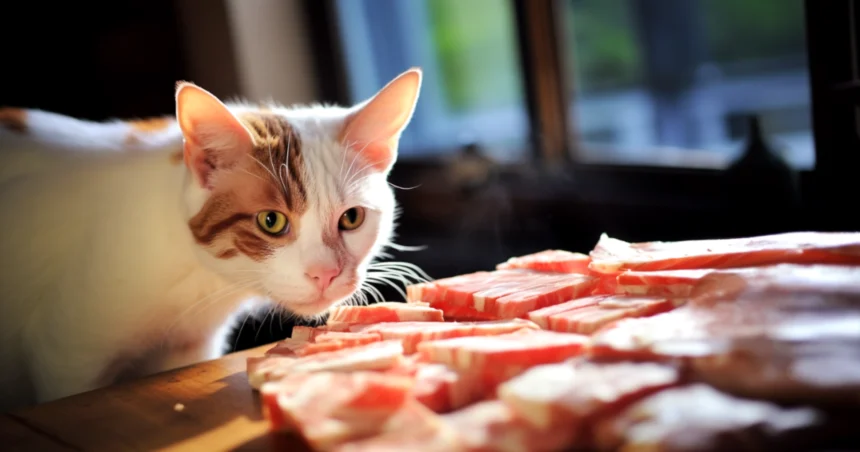As a cat owner, you likely enjoy spoiling your furry friend with treats and human foods as a display of affection. One common snack that gets offered is crispy, savory bacon. While the temptation to share a bite of this mouth-watering meat is understandable, it’s important to consider whether bacon is actually safe for cats to eat. Like humans, cats require balanced nutrition to stay healthy. Fatty, sodium-rich foods like bacon may cause short-term digestive upset and long-term health problems if fed too frequently. Responsible pet parents need to weigh the risks and benefits before introducing new foods. This article will explore whether bacon is an appropriate occasional snack for cats or an unhealthy choice that’s best avoided.
Nutritional Profile of Bacon
While bacon may be delicious to humans, it does not offer ideal nutritional value for cats. Bacon is very high in fat, with about 50% of its calories coming from fat. It also contains substantial amounts of sodium, with a 2-ounce serving providing over 600mg. Cats require protein-rich diets and have no nutritional need for fatty, salty foods.
The high calorie density can quickly lead to weight gain, while the excess sodium can strain the kidneys. The preservatives used to cure bacon may also be problematic. Simply put, bacon’s composition of high fat, salt and calories provides little health benefit for cats.
Health Risks of Feeding Bacon to Cats
Sodium Ion Poisoning
The high sodium content in bacon poses a risk of sodium ion poisoning in cats. Cats’ kidneys are not as efficient at processing excess sodium as humans’. Too much sodium can cause vomiting, diarrhea, confusion, tremors and even seizures in cats. This acute condition requires emergency veterinary treatment.
Long-Term Effects
A diet too high in fat, salt and calories can lead to concerning long-term effects for cats. Obesity, heart disease, kidney disease, pancreatitis and diabetes are potential consequences of excessive intake of fatty, salty foods. These chronic diseases will diminish quality of life and require close veterinary monitoring.
Sensitivity Variances
Just like people, every cat is unique. Some may have a digestive system that can handle occasional treats better than others. However, even the most iron-clad feline stomach isn’t designed to process the high levels of fat and salt found in bacon. It’s crucial to remember that what’s a treat for you could be a trouble for them. So while some cats might not immediately show distress, the internal impact could still be harmful.
Safe Consumption Guidelines
Moderation is Key
If you do choose to occasionally feed your cat a small amount of bacon as a treat, moderation is imperative. No more than a few tiny pieces should be fed at a time, no more than once a month.
Monitoring After Ingestion
After your cat has had a taste of bacon, keep a watchful eye on them. Any change in behavior or physical distress could be a signal that their body is not agreeing with this unusual treat. Look for any signs of stomach upset or changes in drinking and urination habits. These little clues can speak volumes about how they’re handling their savory snack.
Veterinary Consultation
Every cat’s dietary needs and tolerances are different, which is why it’s wise to consult with your vet before introducing bacon, or any new food, into their diet. A veterinarian can provide guidance tailored to your feline’s health profile, ensuring that their occasional treats don’t turn into health tribulations. Plus, they can suggest alternatives that might be just as satisfying for your cat, without the risks.
Alternatives to Bacon
If you want to provide your cat a savory, salty treat, consider healthier alternatives to bacon. Look for dried meat treats formulated just for cats that provide protein without excessive fat or sodium. Options include freeze-dried turkey, chicken, beef, salmon or other feline-appropriate proteins. In moderation, you can also try giving small pieces of baked unseasoned chicken or fish.
For a crunchier texture, cats may enjoy bits of plain baked chicken or fish skin. Just be sure any human food is unseasoned and vet-approved. These protein-based alternatives will satisfy your cat’s cravings without the dangers of bacon.
Conclusion
In summary, while the occasional bacon tidbit may not seriously harm a cat, it does not provide health benefits and poses some risks. It’s best to avoid feeding cats bacon regularly, and instead offer high-protein, low-fat, low-sodium cat treats and foods. By educating yourself and consulting your vet, you can make the healthiest nutritional choices for your feline companion. Responsible pet parents put their cat’s wellbeing first when making feeding decisions.


